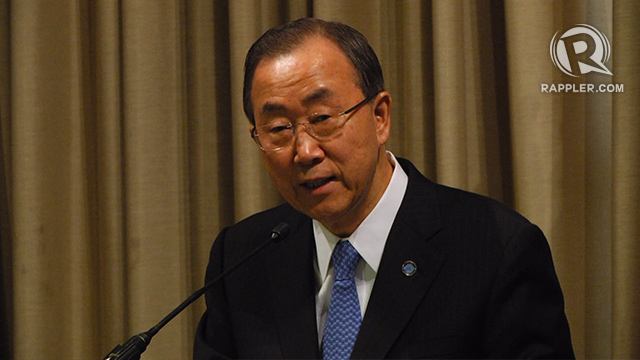SUMMARY
This is AI generated summarization, which may have errors. For context, always refer to the full article.

BAGHDAD, Iraq – UN Secretary General Ban Ki-moon urged Iraqi leaders to address the “root causes” of a surge in bloodshed as security forces clashed on Monday, January 13, with gunmen in violence-racked Anbar province.
But Prime Minister Nuri al-Maliki, standing next to Ban at a joint news conference, insisted the Anbar unrest was not due to internal problems, and that dialogue with militants was not an option.
The UN chief’s visit to Baghdad comes just months ahead of general elections, at a time when Iraq is suffering its worst spate of unrest since 2008 and on a day when attacks killed 23 people.
Militants hold an entire city and parts of another on Baghdad’s doorstep – the first time they have exercised such open control in major cities since the insurgency that followed the 2003 US-led invasion.
“I would urge the leaders of the country… to address the root causes of the problems,” Ban said.
“They should ensure that there is nobody left behind. There should be political cohesion” and “social cohesion, and political dialogue, inclusive dialogue.”
Ban’s remarks echoed US calls for Iraqi officials to focus on political reconciliation in addition to ongoing military operations.
“The security situation in Iraq is undoubtedly a source of great concern,” said Ban, adding he was “deeply concerned by this escalation of violence in Anbar governorate”.
But Maliki insisted that “what is happening in Anbar has no relation to Iraqi problems,” and ruled out dialogue with jihadists.
Events in the province have united Iraqis, he said, and therefore “today, there is nothing called dialogue”.
“Dialogue with whom – with Al-Qaeda? There is no dialogue with Al-Qaeda, and the Iraqi national decision is to end Al-Qaeda,” Maliki said, referring to militant group the Islamic State of Iraq and the Levant (ISIL), which has played a major role in nationwide violence.
Ban is on two-day visit to Iraq and was also due to meet parliament speaker Osama al-Nujaifi, lawmakers, Vice-President Khudayr al-Khuzaie and the head of Iraq’s election commission.
Highway to Jordan, Syria reopened
Iraq is embroiled in a bloody standoff with militants and anti-government tribes in Anbar, the mostly Sunni desert province in west Iraq which shares a long border with conflict-hit Syria.
The country is also experiencing its wost prolonged period of violence since 2008, when it was just emerging from a bloody Sunni-Shiite sectarian war that killed tens of thousands.
Clashes erupted in Anbar on Monday between police and militants in Humairah, an area in provincial capital Ramadi, when security forces attempted to reopen a police station, an Agence France-Presse journalist said.
Fighting was also still raging in the Albubali and Khaldiyah areas between Ramadi and Fallujah, officials said.
Authorities meanwhile reopened a stretch of a highway to Jordan and Syria that had been closed for months by Sunni protesters demonstrating against the alleged mistreatment of their community by the Shiite-led government.
Analysts say that widespread Sunni anger towards the government has fueled the surge of violence in the country.
Militants and anti-government tribes still hold two areas in Ramadi, as well as all of Fallujah, a former insurgent stronghold just 60 kilometers (37 miles) from Baghdad.
Clashes still erupt periodically in Ramadi but civil servants have returned to work in the city, and residents who had fled Fallujah have since begun to come back.
ISIL has been active in the Anbar fighting, but so have anti-government tribesmen.
The army has for the most part stayed outside of Fallujah during the crisis, with analysts warning any assault on the city would likely cause significant civilian casualties.
The Iraqi Red Crescent said it had provided humanitarian assistance to more than 8,000 families across Anbar but that upwards of 13,000 had fled Fallujah.
Fighting erupted in the Ramadi area on December 30, when security forces cleared a year-old Sunni Arab anti-government protest camp.
The violence spread to Fallujah, and militants moved in and seized the city and parts of Ramadi after security forces withdrew.
Iraq was also hit by violence outside Anbar on Monday, with at least 23 people killed nationwide. – Rappler.com
Add a comment
How does this make you feel?
There are no comments yet. Add your comment to start the conversation.